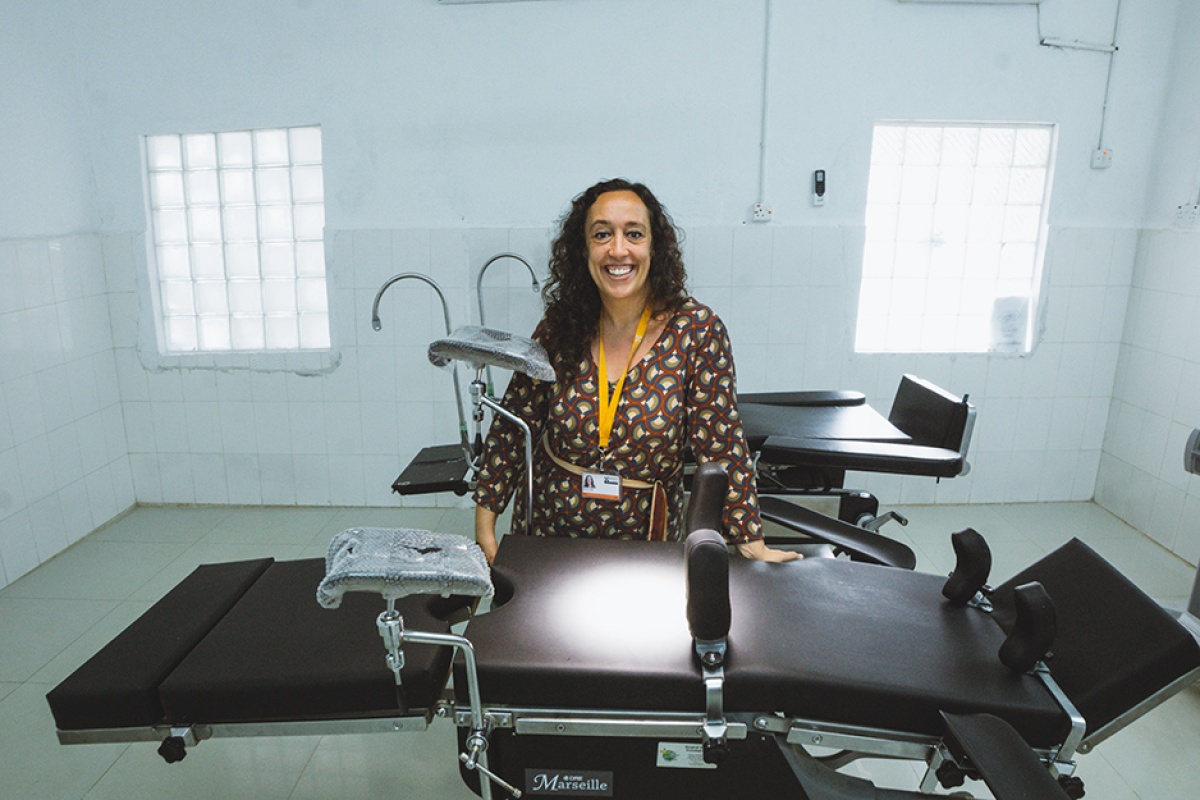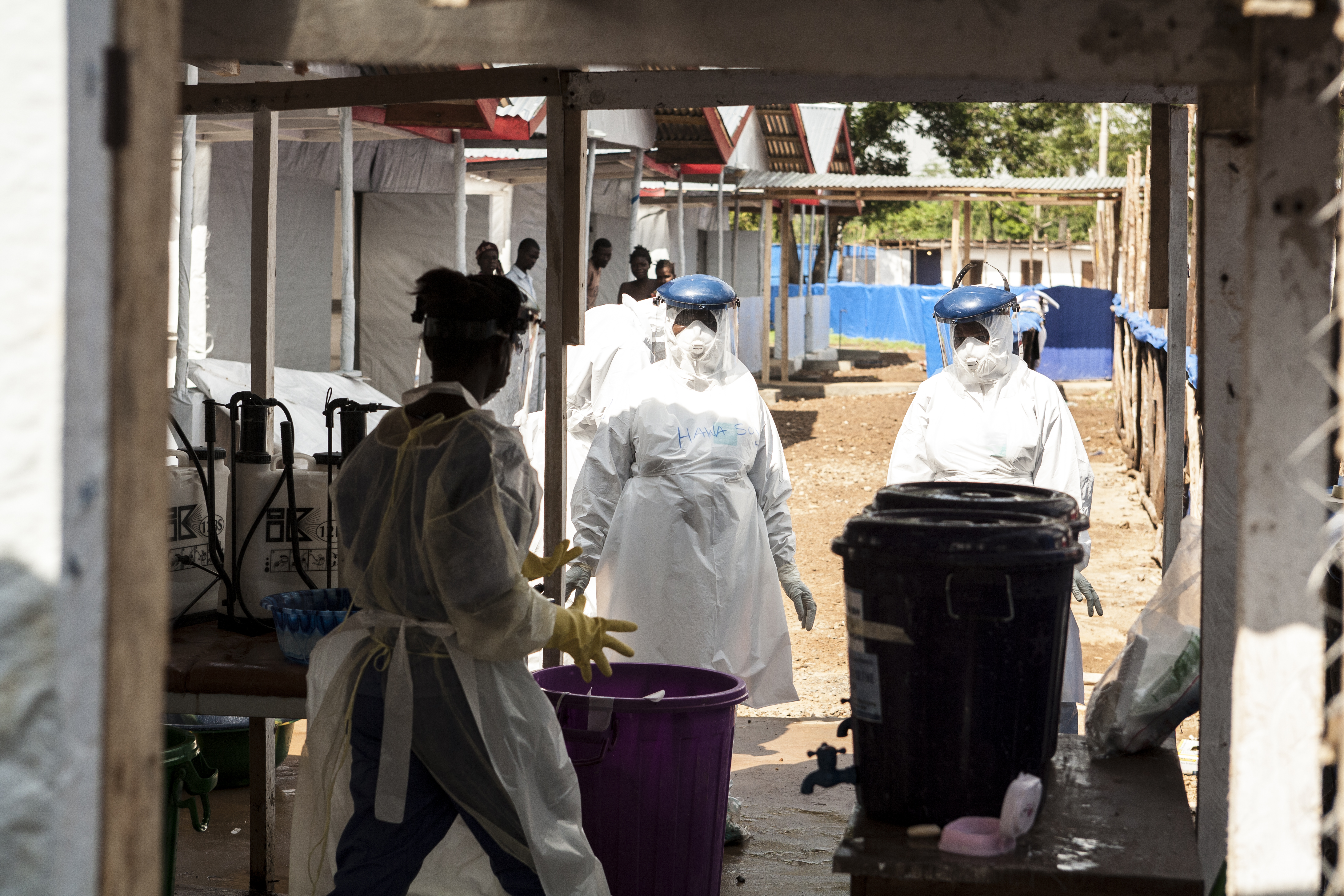Dr. Marta Lado: From Ebola Fighter to PIH-er
Posted on Apr 1, 2019

Dr. Marta Lado is an infectious disease specialist and the chief medical officer of Partners In Health in Sierra Leone. She was among four speakers at PIH's inaugural Evening for Equity on April 2 at the John F. Kennedy Presidential Library and Museum, where she spoke about her experience fighting Ebola in Sierra Leone and how she decided to stay to help build the public health system. Watch a video of her talk HERE.
This story was originally published on October 4, 2018.
Best known among Partners In Health colleagues for her love of exclamation marks and good cheese, Dr. Marta Lado, chief medical officer in Sierra Leone, bursts with energy. The 39-year-old infectious disease specialist from the small town of La Coruna, Spain, completed her medical training in Madrid and then worked in a number of roles across Africa and Asia. Her compassionate spirit led her to Sierra Leone during the height of the Ebola epidemic in 2014, where she helped set up and operate one of the first treatment units in the country. In 2016, at a time when most medical professionals were withdrawing their support, Lado stayed put and soon joined PIH.
Most of Lado’s work now involves collaborating with the Ministry of Health to rebuild and sustain Sierra Leone’s public health system. Still, she can’t quite escape her connection to Ebola. Last month, she published a book, Ebola Virus Disease, that provides an overview on the management of the deadly infectious disease, details historical outbreaks, and shares expertise gained while working in treatment units in Sierra Leone. And this month, she is taking a brief leave to help a World Health Organization team fight the latest outbreak, this time along the border of Uganda and the Democratic Republic of Congo.
We sat down with Lado to discuss what drew her to Sierra Leone in 2014, her experiences working with the Ministry of Health, and patients for whom she wishes she could have done more.
Where did you get your drive to work in countries like Sierra Leone?
My dad comes from a family of farmers who lived in a really poor, rural part of Spain. He was incredibly fortunate when someone offered to pay for his studies, which allowed him to train as a doctor. Because of this, a duty has always been instilled in me to help others if I can. In my view, no one deserves what they’re born with, it should be shared wherever possible.
What’s the best part of your job?
I feel useful. My job makes a difference to others around me, whether that’s through treating someone in the clinic or teaching and mentorship of junior medics.
Of course, I have rollercoaster days with huge ups and downs, but I’ve been here for five years now. What I see is a completely different story to when I arrived. That’s what gets me out of bed in the morning.
You played a prominent role in controlling the spread of Ebola in Sierra Leone. What do you feel you did well at that time?
I stayed. I showed commitment. That has definitely helped show the Ministry of Health that I’m serious about working together now.
On the whole though, I’m not proud of what happened during Ebola. Nobody had the resources to adequately treat anyone, and thousands died needlessly. Often I felt like I was only making a horrific death more dignified.
That’s an incredibly honest answer. Do you feel you could have done anything differently?
For a long time, the international medical community denied it was an alarm situation. Normally it’s possible to contain infectious diseases like Ebola, because they mostly affect villages. This was different, though. Cases reached cities and went out of control. The first patient in Sierra Leone was identified at the end of May 2014. Within six weeks, the disease had spread all over the country.
Sometimes I’ll sit and think about it. Perhaps I should have anticipated its scale of terror sooner and pushed harder for the Ministry’s attention. And internationally too. Everyone just fled. It felt like no one was listening.
What was your day-to-day role during that period?
No one had a clue how Ebola spread or how to properly identify a patient. There were no guidelines whatsoever apart from some developed in 1997, which I followed like my bible. I worked with the Ministry to set up the National Task Force, a group that met weekly to review new Ebola cases and develop guidelines.
Over that period, we collected all sorts of information, like: How should we disinfect patients’ beds? What kind of protective clothing should medical staff wear? How should we dispose of waste? Should we use chlorine, or is soap and water enough? My book expands on this information, highlighting all of the Ebola symptoms and guidelines we identified.

Patients must have felt so angry about what was happening to them at that time.
Sierra Leoneans have an amazing ability to just accept that things are bad for them. They can’t picture what a high standard of care is like, so they never expect it. It’s really heart-breaking.
If a disease like Ebola threatened Sierra Leone again, would we be prepared to combat it?
Yes. Definitely. Our prevention control is better and, most importantly, there has been a shift in mindset among health care workers. Juniors are coming in with a real thirst to make a difference.
But we’re still in trouble. It’s not just about health care; it’s also about society. The basics still need to be addressed: poor hygiene, crowded housing, bad water systems, no gloves in hospitals—the list goes on.
What do you most cherish and need to do your job well?
Staff. We need more expertise here, especially through local hires. We can’t always fill positions with international placements. We should be working with the Ministry to recruit local clinicians who can support the longevity of health care in Sierra Leone.
Great steps are being made already. Last year, PIH got approval from West African College for the first medical training course here in Sierra Leone. We’ve since been able to establish a teaching suite at Koidu Government Hospital in Kono.
If you could snap your fingers and change one thing about health care in Sierra Leone, what would it be?
Make health care free for everyone. Even if it didn’t work properly at first, or ever, it would change a really damaging mindset that Sierra Leoneans currently have around health care. They’ve had too many disappointing experiences of spending money they don’t have, only to receive terrible medical care. People just don’t think to go to the hospital if they get sick.
Are there any patients who stick in your memory most?
It’s all the stupid deaths. If we’d had the very basics, that person wouldn’t have died. They’re the ones who stay with me.
What advice would you give to someone starting out in a similar line of work?
Doing this kind of work, in a culture often different to your own, requires maturity, good training, and a willingness to adapt to situations respectfully.
I’ve often found there’s no right or wrong way to do something. There’s just a way, and it’s important to be flexible to that. Making assumptions on things will disengage colleagues and stunt change. I’m learning that every day.

